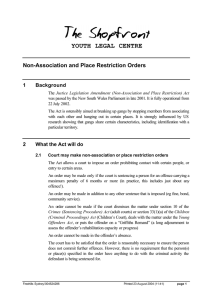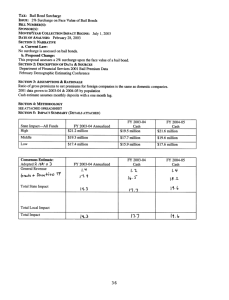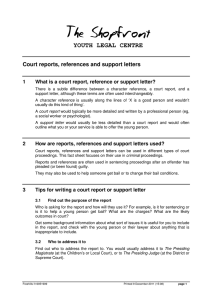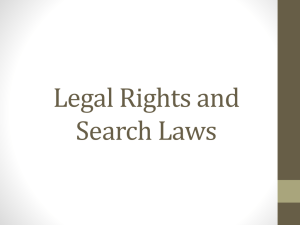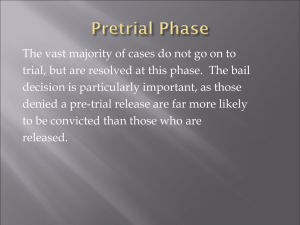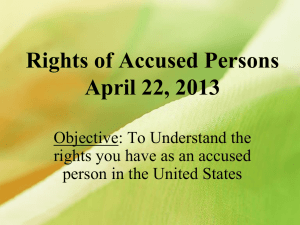2 4 Ma y 2 0... NSW Omb u d s ma n
advertisement
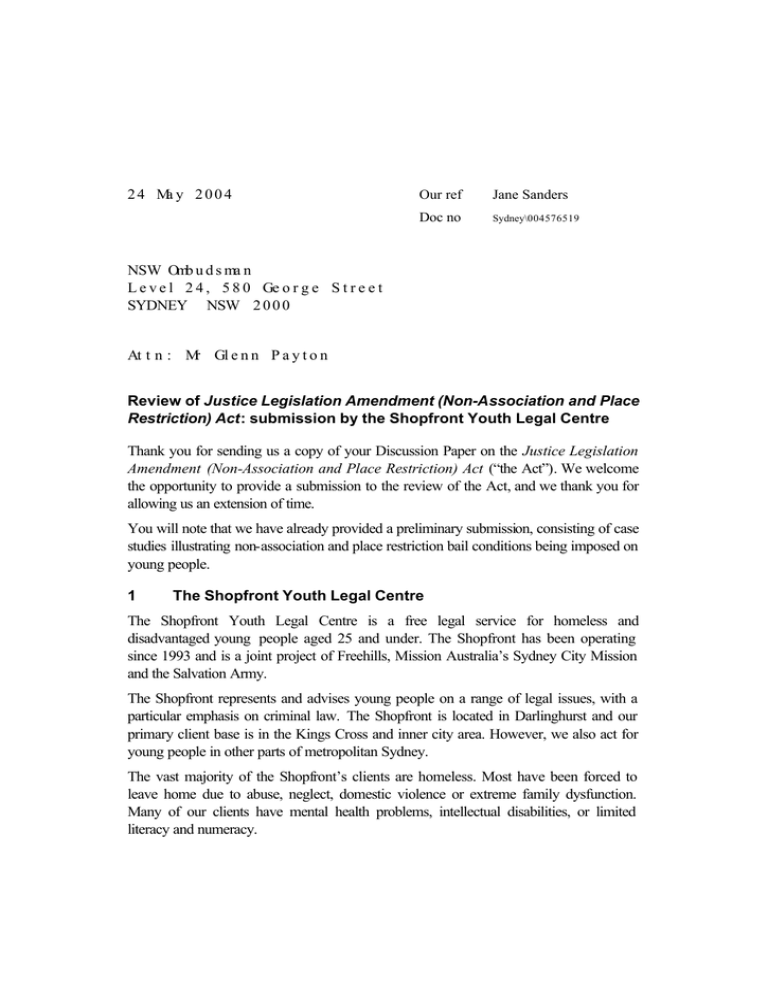
2 4 Ma y 2 0 0 4 Our ref Jane Sanders Doc no Sydney\004576519 NSW Omb u d s ma n L e v e l 2 4 , 5 8 0 Ge o r g e S t r e e t SYDNEY NSW 2 0 0 0 At t n : Mr Gl e n n P a y t o n Review of Justice Legislation Amendment (Non-Association and Place Restriction) Act: submission by the Shopfront Youth Legal Centre Thank you for sending us a copy of your Discussion Paper on the Justice Legislation Amendment (Non-Association and Place Restriction) Act (“the Act”). We welcome the opportunity to provide a submission to the review of the Act, and we thank you for allowing us an extension of time. You will note that we have already provided a preliminary submission, consisting of case studies illustrating non-association and place restriction bail conditions being imposed on young people. 1 The Shopfront Youth Legal Centre The Shopfront Youth Legal Centre is a free legal service for homeless and disadvantaged young people aged 25 and under. The Shopfront has been operating since 1993 and is a joint project of Freehills, Mission Australia’s Sydney City Mission and the Salvation Army. The Shopfront represents and advises young people on a range of legal issues, with a particular emphasis on criminal law. The Shopfront is located in Darlinghurst and our primary client base is in the Kings Cross and inner city area. However, we also act for young people in other parts of metropolitan Sydney. The vast majority of the Shopfront’s clients are homeless. Most have been forced to leave home due to abuse, neglect, domestic violence or extreme family dysfunction. Many of our clients have mental health problems, intellectual disabilities, or limited literacy and numeracy. 2 The objectives and the effectiveness of the Act We would argue that the Act does not meet primary objective, which is to tackle gangrelated crime. The Act was based largely on American research about youth gangs, which is of questionable relevance in an Australian context. The incidence of US-style gangs in Australia is very low. Although offences are often committed in groups, these are more likely to be loose associations of peers than gangs with a clearly-defined identity and territory. The criminal gangs that do exist in New South Wales are more organised and sophisticated, and are unlikely to be seriously affected by non-association or place restriction legislation. There is no evidence that the Act has done anything to break up or weaken criminal gangs. Instead, it appears that the powers in the Act are being used as a way of “cleaning up the streets” and ridding public areas of people who may be an inconvenience or nuisance. We have observed that the powers in the Act are frequently being used against people who are alleged to have committed minor public order, property and drug offences. The people most affected by the Act are disadvantaged young and indigenous people who commonly associate with their peers in public spaces - often because they have no-one else to support them and nowhere else to go. We believe that, by creating a new offence of breaching a non-association or place restriction order, the Act has potential to further entrench disadvantaged people in the criminal justice system. This contradicts efforts to reduce the over-representation of disadvantaged and vulnerable people in the criminal justice system, particularly young people and Aboriginal and Torres Strait Islander people. We acknowledge that negative peer influences and frequenting certain areas may increase the likelihood that a young person will commit offences. However, this problem would be better addressed by providing young people with positive alternatives, rather than imposing coercive measures. We concede that, where serious and persistent offending is involved, it may be appropriate to impose restrictions on where a person goes and with whom he or she associates. However, we are concerned about the frequent use of the powers in the Act against less serious offenders. In our view, non-association and place restriction orders breach the human rights to freedom of association and freedom of movement, unless such an order is clearly justified by the circumstances of the alleged offence. 3 Our clients’ experience of the Act in practice Last year we provided your office with some case studies illustrating some typical nonassociation and place restriction bail conditions imposed on our clients. Since then, similar conditions have been imposed on more of our clients, almost always as a condition of police bail. We continue to be concerned about the inappropriate use of such conditions, and will discuss this issue further below when addressing questions arising from the Discussion Paper. Freehills Sydney\004576519 Printed 24 May 2004 (10:19) page 2 4 Questions raised by the Discussion Paper We do not propose to address all the questions raised, but will comment on issues that are within our direct experience. Question 1: Are the new powers conferred by the Act being used by courts, police, Corrective Services, Juvenile Justice? In our view, the Act has not given police or courts any new powers in relation to bail, bonds, probation and parole. The only genuinely new power conferred by the Act is the court’s power to make nonassociation or place restriction orders when sentencing a person for an offence (under Crimes (Sentencing Procedure) Act s17A or Children (Criminal Proceedings) Act s33D). As the Discussion Paper shows, this option is rarely utilised by courts. None of the Shopfront’s clients has had such an order made against them. We have had no direct experience of non-association or place restriction orders being imposed as a condition of parole or leave from a prison or detention centre. However, many of our clients have been subject to non-association or place restriction conditions on bail. Although these powers existed (and were used by police and courts) before the introduction of the Act, it appears to us that their use has increased since the commencement of the Act. In particular, police appear to have increased their use of place restriction conditions when setting bail, and many magistrates willingly continue such conditions when the matter reaches court. In some areas it appears that police are imposing these conditions systematically against particular types of alleged offenders, without much regard to individual circumstances. Although the Act has not given police any new powers in relation to bail, we believe it has legitimised the use of such conditions in circumstances where they might previously have been considered inappropriate. We will further discuss the use of bail conditions in our responses to subsequent questions. Some courts also attach non-association or place restriction conditions to good behaviour bonds. For example, a number of our clients appearing at Liverpool Local Court have been subject to bonds with conditions restricting them form entering Cabramatta. Conditions of this type were already being imposed before the introduction of the Act, and we are unable to say whether their use has increased. We will discuss problems associated with bond conditions in our response to Question 6. Question 2: Training on non-association and place restriction orders In general, we believe it is desirable that police, judicial officers, probation officers and juvenile justice officers be trained on non-association and place restriction orders. In our view it is important for such training to emphasise that, whilst the powers to make such orders is very broad, the appropriateness of such orders needs to be very carefully considered. Freehills Sydney\004576519 Printed 24 May 2004 (10:19) page 3 We suggest it would be useful to develop a set of guidelines to assist officers to decide whether a non-association or place restriction order is appropriate in a particular case and, if so, what conditions should be imposed. Question 6: General comments on inappropriate non-association and place restriction orders We have already provided case studies about conditions which we believe to be inappropriate, and will provide some further examples below. Non-association and place restriction conditions often impose a serious restriction on the a person’s ability to get on with their daily lives. Many of the conditions are arbitrary and are imposed without regard to the needs of the particular offender. Very often, the conditions are out of proportion with the seriousness of the alleged offence (we will discuss this issue further in our responses to Questions 21and 22). Young people, particularly those who are homeless or otherwise disadvantaged, often find it very difficult to comply with non-association and place restriction conditions. There are a range of legitimate activities which may cause them to fall foul of the condition - including seeking employment, looking for accommodation, using health and welfare services, and socialising with peers or extended family members. Although there are some restrictions on the types of orders that can be imposed, we suggest that this is based on a set of white, middle class, adult assumptions. It does not recognise the extended family relationships of indigenous people, the need for unemployed and homeless young people to access a variety of services, and the types of activities commonly undertaken by young people. We concede that, if such conditions are imposed as part of a bail undertaking, a defendant may apply to have them varied. However, this is no simple matter for many people. To have a bail variation application listed, it is necessary to submit forms, contact the police officer in charge of the case, etc. Even for young people who have access to legal advice, this can be an onerous process. Some young people do not even realise they can apply to vary their bail conditions, or even get free legal advice, prior to their listed court date. Many young people therefore do not apply to vary their bail conditions, instead running the risk they will be arrested for breach. Although breach of bail is not an offence in itself, it typically leads to the person being arrested by police and held in custody until they can be brought to court (usually overnight). More often than not, the court will rerelease the person on bail or, if the person is willing to plead guilty, impose a noncustodial sentence (unless the alleged offence or breach of bail is very serious). By this time the person has spent some time in custody, often for an offence which would not ultimately be punished by way of a custodial sentence. Further, we have acted for several clients who have had their bail conditions varied, but have subsequently been arrested for breach of bail because the police did not update their computer system properly (for example, the case of Lisa, discussed in our preliminary submission). At least one of these people has obtained compensation from the police for wrongful arrest. Freehills Sydney\004576519 Printed 24 May 2004 (10:19) page 4 The attachment of non-association or place restriction conditions to good behaviour bonds (including suspended sentences) can be very problematic. For example, it has been the practice of certain magistrates at Liverpool Local Court to impose a bond or suspended sentence with a condition that an offender not go within a certain distance (1, 2 or 3 km) of Cabramatta Railway Station. Such conditions are usually imposed for drug-related offences such as supply, possession, drug premises offences or drugrelated property crime. Typically, such bonds are 12 months or 2 years in duration, but may be as long as 5 years. We have seen conditions of this type imposed upon people with intellectual disabilities who are often unable to comprehend the consequences of breaching the conditions. Whilst it may be desirable that an offender stay out of Cabramatta to avoid being entrenched in a cycle of drug-related offending, such conditions may impose an unreasonable restriction on a person’s ability to obtain accommodation, employment and services, and also to have contact with extended family and community. Further, circumstances change over time and offenders may find themselves stuck with unworkable conditions for the duration of the bond. Unlike bail and Children’s Court bonds, adult bonds cannot be varied unless breach proceedings are taken against the offender. Question 7: Specific examples of inappropriate non-association and place restriction conditions In our preliminary submission we provided the case studies of Tran, Lisa, Jimmy and Nicky. These are still relevant, as many of our clients continue to be subject to similar conditions. In addition we provide the following example: Jason (in his early 20s) has a record for committing drug offences and was recently charged with a number of property offences, including break enter and steal, and goods in custody. The alleged offences were committed in Kings Cross and, as a condition of his bail, Jason is banned from a large area including kings Cross, Potts Point, Elizabeth Bay, Rushcutters Bay, most of Darlinghurst and most of Woolloomooloo. Although break enter and steal is a serious offence and may warrant strict bail conditions, the use of a place restriction condition in this instance is questionable. There is no evidence of any intrinsic link between being in Kings Cross and committing such an offence – if Jason wants to break into people’s houses, he can do this in any suburb! More importantly, the conditions imposed are unworkable for Jason, who lives in Woolloomooloo and cannot go to his local shops, railway station, etc without breaching his bail. His bail conditions have been amended to allow him to go to his methadone clinic and legal centre, but the court has so far refused allow a further variation. Freehills Sydney\004576519 Printed 24 May 2004 (10:19) page 5 Question 8: How might consideration of issues relating to the use of non-association and place restriction conditions be made more effective? We refer to our response to Question 2. We believe that a set of guidelines (possibly enacted into the legislation or regulations) would assist police, judicial officers and others to consider all relevant issues. Question 9: Comments and suggestions on the use of non-association conditions In many cases we concede it may be appropriate to restrict co-offenders from associating with each other, especially where they are serious or persistent offenders. However, caution must be exercised when imposing such conditions, particularly in relation to young people. Where young people are concerned, it is often the case that co-offenders will be neighbours, schoolmates, cousins, boyfriends/girlfriends, or the like. It is very difficult, if not impossible, for a young person to cease associating with such a person. We have also experienced the situation where young couples are arrested for committing offences together, and are prevented from seeing each other by a nonassociation condition. For example, a 17-year-old client of ours has bail conditions which prohibit her from associating with her 19-year-old boyfriend, despite the fact that their relationship has been ongoing for over two years. In general, young people do not meet the definition of “spouse” or “de facto partner” as they do not live together (or have not lived together for long enough), even if they have a serious and long-term relationship. We suggest that young people’s intimate relationships should be valued on equal terms with more conventional adult relationships. Apart from cases where there are domestic violence or child protection concerns, we believe that it is generally inappropriate to restrict people from associating with each other if they have an ongoing intimate personal relationship. Question 11: Will there be any benefits to amending the definition of “close family” to reflect kinship ties which extend beyond the immediate family? We believe that such an amendment is essential to take into account the family structures of Aboriginal people. No doubt some police officers and judicial officers will find this problematic, on the grounds that it is difficult for them to assess whether a particular person has significant kinship ties with another person. We suggest that, before making a non-association order against a person of Aboriginal or Torres Strait Islander origin, there be a requirement to consult with an appropriate Aboriginal Liaison Officer as to the person’s kinship ties. This also has relevance to people from other ethnic backgrounds, who often have significant ties with aunts, uncles and cousins. Freehills Sydney\004576519 Printed 24 May 2004 (10:19) page 6 Question 12: Comments and suggestions on the use of place restriction conditions generally We have already commented on this issue in some detail, particularly in our response to Question 6. We will make some further comments and suggestions in our responses to subsequent questions. Question 13: Examples of situations where people have been prohibited from accessing support services Many of our clients have been subject to bail conditions which restrict access to legitimate and necessary services including: (a) Health centres - eg the Kirketon Road Centre (Kings Cross), the Drug Intervention Service Cabramatta (which operated until July 2003); (b) Services for injecting drug users – eg needle exchange vans in various areas, the Medically Supervised Injecting Centre (Kings Cross); (c) Legal services - eg the Shopfront Youth Legal Centre and the Inner City Legal Centre (both in Darlinghurst), the outreach service formerly operated by the Shopfront at the Drug Intervention Service Cabramatta (before its closure in July 2003); (d) Welfare services – eg the Crossing (a youth support service operated by Mission Australia in Kings Cross), Open Family (Cabramatta). The case studies of Tran and Nicky (provided in our preliminary submission) and of Jason (in our response to Question 7 above) provide examples of the hardship caused by such conditions. Not only can these conditions create personal hardship, but they can also have wider public health implications by reducing access to health services (particularly harm minimisation measures for injecting drug users). Question 14: Are there any benefits to amending the definition of what a place restriction order can and cannot restrict? We would like to see the list of what a place restriction order cannot restrict broadened to include such places as: • employment services • welfare services • health services • government agencies such as Centrelink • community or cultural centres • public transport routes, stations and stops Freehills Sydney\004576519 Printed 24 May 2004 (10:19) page 7 habitually used by the defendant. We would also suggest that a place restriction order ought not to prevent a person from accessing local services such as shops, banks, etc, in circumstances where they have no realistic alternatives (eg they live in or near a country town and the next town is a significant distance away). Question 15: Are there any benefits to imposing blanket place restriction conditions? We presume a “blanket” place restriction condition to mean a condition that is not specifically designed for a particular offender, but rather is a general condition imposed on a class of offenders to prohibit them from entering a certain area. In our view, such conditions are a clumsy and arbitrary policing tool, with the potential to cause great injustice. The only possible benefit to imposing blanket place restriction conditions is that they may be easier to police than individually-tailored conditions. However, we believe that this is insufficient justification for their use. Question 19: Comments on whether Aboriginal and young people are more likely to be arrested for allegedly breaching bail conditions Our experience suggests that Aboriginal and young people are more likely to be arrested for alleged breaches of bail. Firstly, young and indigenous people are more likely to have strict conditions imposed on them because of actual or perceived instability. Secondly, they are likely to attract the attention of police because of their appearance, behaviour or their frequent use of public space. Thirdly, they are less likely than non-indigenous adults to seek out legal assistance to vary unreasonable or unworkable bail conditions. Being arrested for breach of bail is even more likely if the person is homeless or has a mental or intellectual disability. Question 20: Examples of people having breached understanding of conditions imposed bail because of lack of We do no have any specific examples of people who have breached non-association or place restriction conditions because of lack of understanding. However, some of our clients have inadvertently breached other types of conditions (eg police reporting, curfews) because they do not understand, or are confused about, the conditions. We believe there is a high potential for defendants to misunderstand place restriction conditions, due to their limited knowledge of local geography and poor skills at reading maps (especially if their literacy or English is limited, which is often the case for people involved in the criminal justice system). Freehills Sydney\004576519 Printed 24 May 2004 (10:19) page 8 Question 21: Are police imposing conditions that are unwarranted by the severity of the alleged offence? We have observed that police are frequently imposing bail conditions that are unwarranted by the seriousness of the alleged offence. In our experience, it is relatively common for place restriction conditions to be imposed as a condition of police bail for summary offences. Some of these offences (eg disobey police direction) are punishable by fine only. Others (eg possess prohibited drug, solicit within view of a dwelling) potentially carry custodial sentences but are usually dealt with by way of fine or other non-custodial sentence. Judicial Commission statistics show that only 1% of offenders are imprisoned for soliciting offences, about 4% for possession of heroin, 5% for possession of cocaine, and 2% for possession of other drugs. The majority of these offences are dealt with by fine, bond or section 10 dismissal. The case study of Lisa (in our preliminary submission) is an example of a systematic practice adopted by police in relation to street sex workers in the Bankstown area. There is an industrial area on and around Canterbury Road, which has a long tradition of being used for street sex work. Most of this area is not within view of dwellings, churches, schools or hospitals, and it is therefore lawful to solicit for prostitution there. However, several sex workers have been arrested in the vicinity of the “Christian Life Centre” which used to occupy premises on Canterbury Road, and charged with soliciting within view of a church. Some have been charged with soliciting near a dwelling (even where the nearest dwellings were considerable distance away and now within view) and others with participating in an act of prostitution in a public place. In most cases the bail conditions ban them from several blocks in the area where they work. In many cases the alleged offender was clearly not guilty of the charge (for example, charges were still being laid for soliciting within view of a church even after the Christian Life Centre vacated its premises in May 2003). However, defendants would plead guilty in order to rid themselves of the restrictive bail conditions, so they could return to pursue their lawful occupation in an area where it is lawful to solicit for prostitution. If a defendant pleads not guilty, it can take several weeks or months before a hearing date is set. In the meantime, the bail conditions continue unless the magistrate sees fit to vary them (and, in our experience, the magistrates at Bankstown Local Court have generally been reluctant to vary these bail conditions). The fact that there is such a strong disincentive to defend the charge - even where there appears to be a strong defence – leads to grave injustice. In some cases we have assisted clients to correct this injustice on appeal, by seeking the District Court’s leave to withdraw the plea of guilty and re-open the matter. However, it should not be necessary to go to such extreme lengths. We believe conditions of the kinds imposed on Lisa and Tran (see our preliminary submission and our response to question 22) are out of proportion with the seriousness of the alleged offences. They are unjustified from a civil liberties point of view, even if Freehills Sydney\004576519 Printed 24 May 2004 (10:19) page 9 the person has no difficulty complying with the conditions. It would be ludicrous to expect a middle-class person to be banned from, say, Bondi Beach, just because they were caught drunk-driving, swearing or littering in the area. However, many police officers seem to think it is reasonable to ban disadvantaged people from certain areas for offences of similar gravity. In our view, offences that are punishable by way of fine only should never have bail conditions attached (except perhaps in truly exceptional circumstances) but should be brought to court by way of a “no bail” court attendance notice. We are also of the view that “no bail” CANs or unconditional bail should be used for summary offences generally, unless special circumstances exist (eg it is an offence such as breach AVO, or there is otherwise a risk of violence, intimidation or serious property damage). Bail conditions should not be imposed as a way of punishing people or deterring “nuisance” type conduct – this function is performed by the court when imposing a penalty for the offence once the person has pleaded (or been found) guilty. We refer to section 37 of the Bail Act which reads in part: (1) Bail shall be granted unconditionally unless the authorised officer or court is of the opinion that one or more conditions should be imposed for the purpose of: (a) promoting effective law enforcement, or (b) the protection and welfare of any specially affected person, or (c) the protection and welfare of the community, or (d) reducing the likelihood of future offences being committed by promoting the treatment or rehabilitation of an accused person. (2) Conditions shall not be imposed that are any more onerous for the accused person than appear to the authorised officer or court to be required: (a) by the nature of the offence, or (b) for the protection and welfare of any specially affected person, or (c) by the circumstances of the accused person. Question 22: Examples of situations where bail conditions are being imposed for offences which could be dealt with by way of fine We are not sure precisely what is meant by “could be dealt with by way of fine”. If this means offences that could be dealt with by way of infringement notice instead of court proceedings, or offences that are punishable by fine only, then the offence of disobeying a police direction is a good example. The case study of Tran, provided in our preliminary submission, is just one instance of a long-standing and systematic police practice. Typically the police would direct a person to stay out of Cabramatta for 7 days. If the person was found in Cabramatta within the Freehills Sydney\004576519 Printed 24 May 2004 (10:19) page 10 7-day period, the police would issue another direction in similar terms. If the person was found in Cabramatta again within the next seven days, they would be arrested, charged with disobeying a police direction, and granted bail on the condition that the person not come within a certain radius (typically somewhere between 1km and 3km) of Cabramatta railway station . If an infringement notice is not appropriate for whatever reason, and court proceedings are necessary, a Field Court Attendance Notice would be appropriate. In our view, arrest and charge are only appropriate where the defendant’s conduct is extremely disruptive or violent (in which case they would probably be charged with a more serious offence in any event) or where the police are able to establish the defendant’s identity. Defendants found in Cabramatta while still on bail would invariably be arrested for breach of bail and would spend a night in the police cells before being taken to court the following morning. Most would then plead guilty to the offence and be released with a fine. The bail conditions imposed are far more onerous than is warranted by the nature of the charge, and we suggest that they are being used inappropriately as a means of punishment and social control. We are gravely concerned that people are spending time in custody (both during the initial arrest and charge process, and after any actual or alleged breach of bail) for an offence which does not carry a custodial penalty. We are also concerned that defendants often plead guilty to this offence, as a means of getting rid of the bail conditions, in circumstances where the prosecution would have great difficulty proving its case if the matter were defended. The Shopfront has assisted clients to defend several of these cases and in each case, the charge has either been withdrawn by the prosecution or dismissed by the court. One matter was dismissed by the magistrate on the grounds that a blanket 7-day direction was arbitrary and unlawful. Since then, police prosecutors have withdrawn charges for breaching 7-day directions (at least where the defendant pleads not guilty) and the Cabramatta police have modified their direction-giving practices. We understand that police are still issuing directions, but for shorter periods, and are still imposing similar bail conditions. However, we are unable to comment more specifically on current practices because the Shopfront is no longer operating an outreach service in Cabramatta (since the closure of the Drug Intervention Service Cabramatta in July 2003). We have already provided examples of place restriction bail conditions being imposed for offences which are most commonly dealt with by way of fine. Question 23: Benefits of not imposing place restriction conditions for minor offences We believe we have already answered this question in our response to questions 21 and 22. We would add that one benefit of not imposing such conditions for minor offences is the saving of police, court and legal aid resources. It is important to consider not only the “benefits of not imposing place restriction conditions”, but the wrongfulness of imposing such conditions for minor offences. Freehills Sydney\004576519 Printed 24 May 2004 (10:19) page 11 5 Summary and recommendations In summary, we have concerns about the way the Act is operating in practice. In particular, we are concerned about the way police are using place restriction bail conditions against people who are alleged to have committed minor offences. Our main recommendations are: (a) That s100A of the Crimes (Sentencing Procedure) Act be amended so that people cannot be prohibited from associating with significant extended family members or people with whom they have intimate personal relationships, and cannot be prevented from accessing the types of places listed in our response to Question 14. (b) That guidelines be developed to assist police, judicial officers, corrective services and juvenile justice officers to set appropriate non-association and place restriction conditions. (c) That the Bail Act and/or the Criminal Procedure Act be amended to make it mandatory for “no bail” court attendance notices to be used for offences punishable by way of fine only (save in exceptional circumstances) and that there be a presumption that “no bail” court attendance notices (or unconditional bail) be used for summary offences. We also suggest there should be a prohibition on non-association and place restriction bail conditions for summary offences, except those involving personal violence. (d) That there be restrictions on a court’s power to impose a non-association or place restriction order as a condition of a bond. We would suggest that the Crimes (Sentencing Procedure) Act and the Children (Criminal Proceedings) Act be amended to prohibit the imposition of non-association or place restriction conditions as part of a good behaviour bond. At the very least, the duration of such a condition should be limited to 12 months. Otherwise courts will continue to use bonds as a “back door” way of imposing nonassociation and place restriction orders longer than the 12 months permitted by Crimes (Sentencing Procedure) Act s17A and Children (Criminal Proceedings) Act s33D. We also recommend that the Crimes (Sentencing Procedure) Act be amended to allow adult bonds to be varied on the application of the offender. (e) That courts have power to make non-association or place restriction orders only when sentencing a person for an indictable offence (or even a “serious indictable offence” - ie an offence punishable by imprisonment for 5 years or more). Such orders are a serious imposition on a person’s liberty, and breaching them can have serious consequences. Therefore we are of the view that they should only be made where a person has committed a relatively serious offence. Yours faithfully Freehills Sydney\004576519 Printed 24 May 2004 (10:19) page 12 Jane Sanders Principal Solicitor Freehills Sydney\004576519 Printed 24 May 2004 (10:19) page 13
